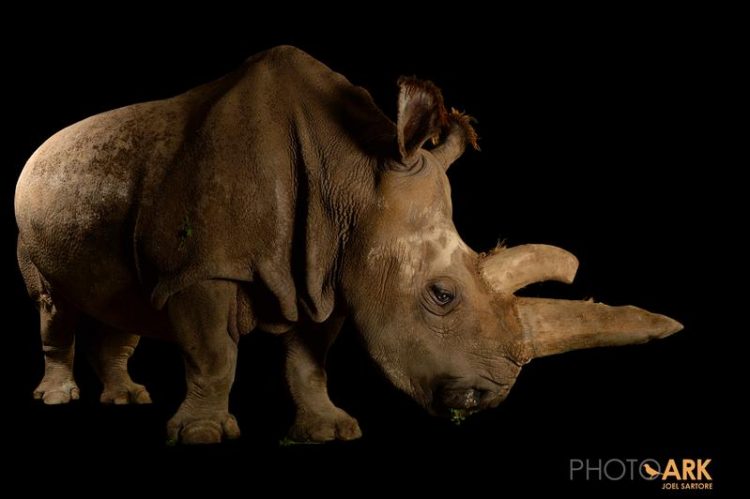Saving the Northern White Rhino – International Rescue Meeting in Vienna

Northern White Rhino. Joeal Sartore
Only three individuals remain after the death of Nola, a 41-years old northern white rhinoceros (Ceratotherium simum cottoni) at the San Diego Zoo Safari Park on 22nd November, and Nabiré, a 32-years old female at ZOO Dvůr Králové on 27th July, 2015.
The last three individuals, a male and two females, presently live at Ol Pejeta Conservacy in Kenya. Age and reproductive challenges make the possibility of natural reproduction unlikely but the DNA of a dozen individual northern white rhinos has been preserved in genetic banks in Berlin and San Diego. The experts hope to use this genetic information to bring back the species.
Leading scientists will use their broad spectrum of expertise to rescue the last northern white rhinos by joining forces. They will discuss possible options and come up with an international rescue plan that will hopefully save the northern white rhinos and may help to save other species as well.
Options that have been brought up during preliminary discussions include sperm and egg generation from other cell types, laboratory egg fertilisation and embryo culture, and the use of the closely related southern white rhinoceros (Ceratotherium simum simum) as surrogates.
One special focus will concentrate on the development of cellular techniques for conservation. This new approach is an essential, promising option for highly endangered wildlife. For this purpose the world's leading scientists in the field of “cellular techniques” will discuss new methods of securing and preserving wildlife tissue samples.
The international rescue meeting will have a net zero carbon footprint.
The Leibniz Institute for Zoo & Wildlife Research (IZW) is an internationally renowned research institute of the Leibniz Association. With the mission of “understanding and improving adaptability” it examines evolutionary adaptations of wildlife and its resilience to global change, and develops new concepts and measures for conservation. To achieve this, the IZW uses its broad interdisciplinary expertise in evolutionary ecology and genetics, wildlife diseases, reproductive biology and management in a close dialogue with stakeholders and the public.
www.leibniz-izw.de
Founded in 1752 Schönbrunn Zoo in Vienna is the oldest zoo in the world. In a unique combination of protected monument and modern zoo biology it is home to more than 700 animal species, for example the rare Giant Pandas. Four times in succession the Schönbrunn Zoo received an award as the best zoo in Europe.
This unique zoo is scientifically managed and its mission is to interest visitors in the world of animals, and to enhance their awareness for the conservation of threatened wildlife species. Schönbrunn Zoo is not just a place for recreation and to come to see animals, it is also an educational centre, a site for research and teaching, and a strong partner in nature and species conservation projects.
www.zoovienna.at
Bringing species back from the brink of extinction is the goal of San Diego Zoo Global. As a leader in conservation, the work of San Diego Zoo Global includes on-site wildlife conservation efforts (representing both plants and animals) at the San Diego Zoo, San Diego Zoo Safari Park, and San Diego Zoo Institute for Conservation Research, as well as international field programs on six continents.
The work of these entities is made accessible to children through the San Diego Zoo Kids network, reaching out through the Internet and in children’s hospitals nationwide. The work of San Diego Zoo Global is made possible by the San Diego Zoo Global Wildlife Conservancy and is supported in part by the Foundation of San Diego Zoo Global.
www.sandiegozooglobal.org/overview
ZOO Dvůr Králové has been one of the most important breeders of African ungulates in the world since the late 1970s. The zoo is dedicated to conserving African wildlife through both ex situ and in situ efforts as well as promoting African culture and wildlife conservation. Four northern white rhinos have been born in the zoo and in 2009 it collaborated with its partners to transfer then four northern white rhinos from Dvůr Králové to Ol Pejeta Conservancy, Kenya, in hope to further prompt their breeding.
www.zoodvurkralove.cz/en/
Contact:
Steven Seet
seet@izw-berlin.de
Unit Press & Communications
Leibniz Institute for Zoo and Wildlife Research (IZW)
of the Forschungsverbund Berlin e.V.
Alfred-Kowalke-Straße 17
10315 Berlin
GERMANY
P.O.Box 70 04 30, 10324 Berlin
Tel. + 49 – 30 – 51 68 – 125
Cell + 49 – 177 857 26 73
Fax + 49 – 30 – 51 26 – 104
Christina Simmons
csimmons@sandiegozoo.org
Public Relations
San Diego Zoo Global
p. 619 685 3291 c. 619 318 3348
P.O. Box 120551
San Diego, CA 92112-0551
USA
Dr Thomas Voracek
office@zoodoc.at
Veterinary practice Tiergarten Schönbrunn
Seckendorff – Gudent Weg 6
1130 Vienna
Austria
Tel: +43 (0)1 – 8772001
Fax: +43 (0)1 – 8772080
Jan Stejskal
jan.stejskal@zoodvurkralove.cz
Vedoucí komunikace a mezinárodních projektů /
Director of Communication and International Projects
ZOO Dvůr Králové
544 01 Dvůr Králové nad Labem
Czech Republic
Tel: +420 608 009 072 | +420 499 311 226
http://www.leibniz-izw.de
http://www.zoovienna.at
http://www.sandiegozooglobal.org/overview
http://www.zoodvurkralove.cz/en/
Media Contact
All latest news from the category: Event News
Newest articles

Parallel Paths: Understanding Malaria Resistance in Chimpanzees and Humans
The closest relatives of humans adapt genetically to habitats and infections Survival of the Fittest: Genetic Adaptations Uncovered in Chimpanzees Görlitz, 10.01.2025. Chimpanzees have genetic adaptations that help them survive…

You are What You Eat—Stanford Study Links Fiber to Anti-Cancer Gene Modulation
The Fiber Gap: A Growing Concern in American Diets Fiber is well known to be an important part of a healthy diet, yet less than 10% of Americans eat the minimum recommended…

Trust Your Gut—RNA-Protein Discovery for Better Immunity
HIRI researchers uncover control mechanisms of polysaccharide utilization in Bacteroides thetaiotaomicron. Researchers at the Helmholtz Institute for RNA-based Infection Research (HIRI) and the Julius-Maximilians-Universität (JMU) in Würzburg have identified a…



